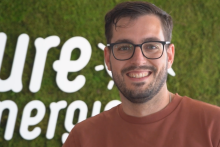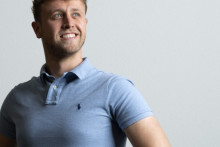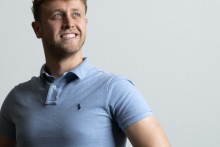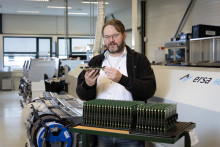‘The underlying goal of our department is to reduce the cost of wind energy’, says Van der Deijl. ‘In the beginning we focused mainly on the design of the turbine itself, both aerodynamically and structurally. Now that the designs have steadily improved, we are also looking for benefits in the prerequisites, such as the operational aspect of wind turbines and their maintenance. The main question is then: how can we design future offshore wind farms efficiently? And in addition: how can we get maintenance teams out to them as efficiently as possible? These are important questions, because the sea is a demanding environment. Wind farms need ten to twelve maintenance visits each year, so there's a lot to gain if you are smart. To this end, we are also investigating the role robotics can play in creating even more efficiency. We have developed a lot of our own software. This helps us with our own research, but we also sell the software to industry.'
 Many different things
Many different things
'I studied aerospace engineering in Delft. After that I did a master's degree in aerodynamics, specifically in the field of wind energy. The work at TNO is extremely varied, but I made a conscious choice to do this. In the past year I have had the opportunity to try many different things: not only research, but also writing proposals and consulting with clients. The great thing about TNO is that you can go in any direction. For myself, I can well imagine staying happy as a researcher. But who knows, maybe in a few years, I'd like to be more involved with clients. The good thing is that at TNO you can do that.'
'TNO does so much! If something needs to be investigated in the Netherlands, TNO does it. That's why we're in the news so much. I see the power of TNO in connecting. The organisation is very good at bringing people and research together. It really feels like we're in the middle of that triangle between university, business and government. Moreover, TNO offers a very relaxed working environment, with pleasant working conditions. You have a lot of freedom and are allowed to organise lot of your work yourself, although that also equires responsibility. It's not always easy, but it's more fun in the end.’
Technology of the future
‘Quantum technology is in its infancy, but it’s the technology of the future’, says Fahrenfort. ‘Our department’s task is to bring this technology to a higher level to make it suitable for use in the business community. In order to achieve this, we do a lot of things together within QuTech, a joint venture of TNO and TU Delft.’ A team is working with KPN on the creation of a quantum internet between Delft, the Hague, Leiden and Amsterdam. ‘I myself am a member of the Quantum Inspire team. We’re building a demo version of a quantum computer, which means working with technology developed at the university – from the chip to the control equipment. We’re bringing these components together to create a real, working quantum computer. I contribute to five sub-projects, one of which I’m the lead system engineer of. In this project, we’re developing a super-stable magnet that will allow other researchers to make reliable measurements of quantum mechanical effects.

Why did I definitely want to work here? Come on, TNO is great, isn’t it? I see it every time I read something in the paper that makes me think: hey, someone should figure that out. I then read a few lines later: TNO has researched it! If I were to do my job purely to make money, I wouldn’t derive much enthusiasm from it. TNO wants to make society better and help small and medium-sized enterprises in the Netherlands move forward. And although the practical usefulness of quantum technology is still far in the future, developing the societal value of the technology is the approach of my work here.’
'TNO is a knowledge institute which appreciates people and stimulates them to acquire more'
TNO is a knowledge institute which appreciates people and stimulates them to acquire more knowledge. 'You can develop yourself in the direction of your choice and you’ll get a lot of help with that. For the first two years, they plan personal development courses for you, and that really is a wide range of useful courses. Whenever I’ve wanted to learn more about technology, I’ve never been refused a single course. They sometimes say: after university, you’re done with learning. That’s certainly not the case at TNO. All projects are set up in such a way that you learn something from them. It’s also very easy to change departments. You then do something in the same line of expertise but on a completely different theme. That’s another way to learn. It’s what makes TNO so strong: there is so much expertise in so many areas. If there’s a question, there’s always someone who has the answer.’
atomic memory
Fahrenfort studied Applied Physics at TU Delft with a Master’s degree that garnered a considerable amount of publicity. ‘The result of my Master’s research was the smallest computer memory ever made. This was atomic memory, although we had already used quantum technology for its operation. After all, quantum mechanical effects are also present at the atomic level.’
 This article was published in the second editon of the 4TU Career Special, a shared publication by the news editors of Cursor (Eindhoven University of Technology), Delta (Delft University of Technology), Resource (Wageningen University and Research), and U-Today (University of Twente). The magazine came into being in collaboration with industry, and is explicitly aimed towards students who are either in the final phase of their studies, or have just graduated.
This article was published in the second editon of the 4TU Career Special, a shared publication by the news editors of Cursor (Eindhoven University of Technology), Delta (Delft University of Technology), Resource (Wageningen University and Research), and U-Today (University of Twente). The magazine came into being in collaboration with industry, and is explicitly aimed towards students who are either in the final phase of their studies, or have just graduated.


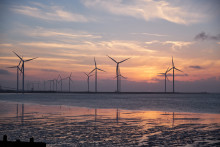
 Many different things
Many different things